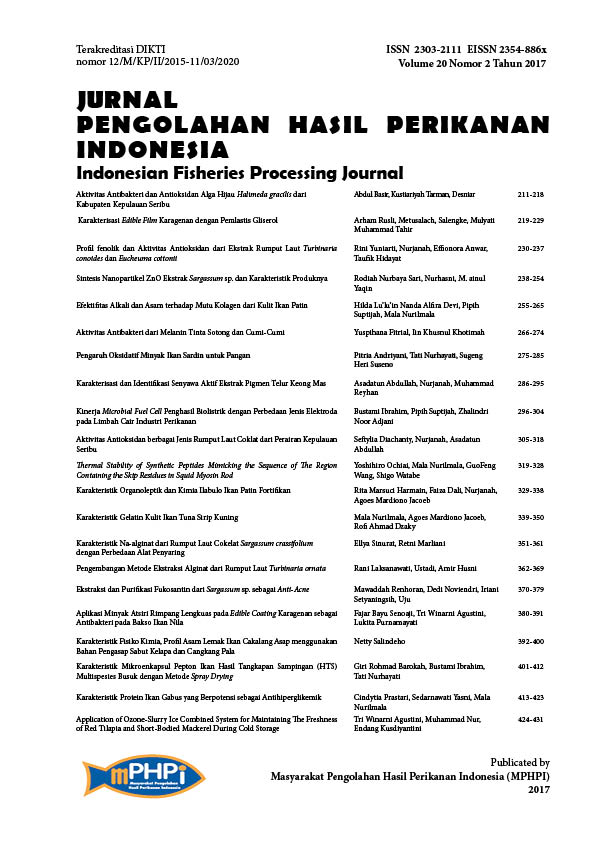Effectiveness of Alkali and Acid to Produce Collagen from Fish Skin of Striped Catifish
Abstract
Fish skin is one of the alternative sources contained high protein to isolate collagen. Fish skin generally extracted by the method of acid, alkali and enzymes. The study aim to determine the effectiveness of NaOH
and acetic acid on catfish (Pangasius sp.) skin extraction process. The concentrations of alkaline pretreatment were 0,05; 0,1; 0,15 and 0,2 M with the soaking time of 2, 4, 6, 8 and 10 h by NaOH replacement in every 2 h. The concentrations of acetic acid for hydrolisis process were 0.05; 0.1; 0.15 and 0.2 M with the soaking time of 1, 2, and 3 h. The experimental design used for pretreatment process is split splot, while for the hydrolysis process is factorial completely randomized design. The results showed that pretreatment with a concentration of 0.05 M NaOH for 4 h has a significant effect for eliminating non-collagen protein (p<0.05). The acetic acid concentration of 0.15 M for 1 h also has a significant effect on fish skin swelling. The yield of striped catfish collagen was 17.272%, the protein content was 86%, and the viscosity was 12 cP. Fish skin extract was identified as type I collagen by functional groups and electrophoretic analysis. Collagen from striped catfish skin has α1 and α2 and protein structure with the molecular weight of α chain were 94 and 98 kDa, meanwhile the molecular wheight of β chain was 204 kD.
and acetic acid on catfish (Pangasius sp.) skin extraction process. The concentrations of alkaline pretreatment were 0,05; 0,1; 0,15 and 0,2 M with the soaking time of 2, 4, 6, 8 and 10 h by NaOH replacement in every 2 h. The concentrations of acetic acid for hydrolisis process were 0.05; 0.1; 0.15 and 0.2 M with the soaking time of 1, 2, and 3 h. The experimental design used for pretreatment process is split splot, while for the hydrolysis process is factorial completely randomized design. The results showed that pretreatment with a concentration of 0.05 M NaOH for 4 h has a significant effect for eliminating non-collagen protein (p<0.05). The acetic acid concentration of 0.15 M for 1 h also has a significant effect on fish skin swelling. The yield of striped catfish collagen was 17.272%, the protein content was 86%, and the viscosity was 12 cP. Fish skin extract was identified as type I collagen by functional groups and electrophoretic analysis. Collagen from striped catfish skin has α1 and α2 and protein structure with the molecular weight of α chain were 94 and 98 kDa, meanwhile the molecular wheight of β chain was 204 kD.
Authors
DeviH. L. N. A., SuptijahP., & NurilmalaM. (2017). Effectiveness of Alkali and Acid to Produce Collagen from Fish Skin of Striped Catifish. Jurnal Pengolahan Hasil Perikanan Indonesia, 20(2), 255-265. https://doi.org/10.17844/jphpi.v20i2.17906
Authors who publish with this journal agree to the following terms:
- Authors retain copyright and grant the journal right of first publication with the work simultaneously licensed under a Creative Commons Attribution License that allows others to share the work with an acknowledgement of the work's authorship and initial publication in this journal.
- Authors are able to enter into separate, additional contractual arrangements for the non-exclusive distribution of the journal's published version of the work (e.g., post it to an institutional repository or publish it in a book), with an acknowledgement of its initial publication in this journal.





